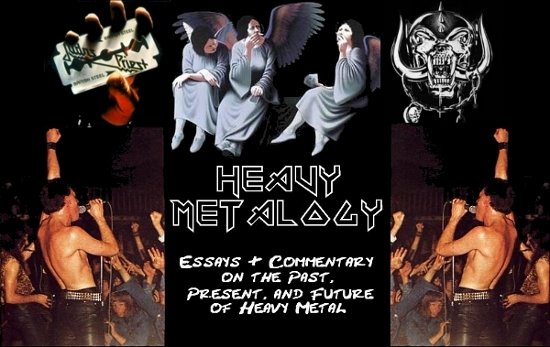As any heavy metal fan will tell you, there’s good metal and bad metal, though every fan’s definition of each varies. One thing that is clear to me in metal’s recent resurgence in America – called the New Wave of American Heavy Metal by some – some of the young turks just have not yet learned how to write a song.
The guitar riff is certainly one of the more important elements of a metal song, but the consistent “chugga-chugga-chugga” Little-Engine-That-Couldn't riffing that only stops for a chorus in many recent metal songs ends up resembling the sound of a car engine that won’t turn over rather than an actual song. All of the classic thrash bands were well aware that you had to do something interesting in the song beside riffing. Slowing down the riff to make it a doom metal “song” doesn’t quite cut it either. Even songs which are made up of technically skillful soloing are often unmemorable as well. To take DragonForce as an often-cited example, I have listened to their last three CDs several times and although I am impressed by the band’s talent I couldn’t tell you the names of any of their songs nor recall any of their melodies in my head. Compare that to the big thrash bands of the 1980s - how did Metallica, Megadeth, Slayer, Anthrax, Testament, and Exodus break out while hundreds of other thrash bands crashed and burned? For one, they wrote better songs than those whom disappeared.
Many of the old masters know how to do it right – Metallica’s early records really showed that the band had a distinct understanding of how to compose a thrash song – “Creeping Death,” for example, broke up the verses with solos and the famous “Die! Die!” bridge that has since become a highlight of Metallica concerts. But they can still get it wrong – St. Anger shows how good songwriters can compose terrible songs if they lack some kind of meaningful structure. Yes, we all pick on St. Anger, but in hindsight St. Anger exposed how hollow metal with lazy song structure sounds, even if handled by proficient veteran songwriters. Machine Head is another great example – their most recent album, The Blackened, features far superior songwriting than their nu-metal effort, The Burning Red. Just compare the lazy “rap” breaks over “From This Day” to the time changes of “Aesthetics of Hate,” and there is not question which is the better song. One has something interesting to offer, the other is just an interchangeable single that any band that had a member with dreadlocks could have put out in 1999.
However, there is a huge difference between songwriting structure and following a formula. I’m not saying that metal music needs to be formulaic – formula turned hair “metal” into a bad punch line in the early 90s and spawned god-awful nu-metal in the late 90s. Ever notice how the vocals in nu-metal music are turned way up in the mixes to catch your attention? Listen to an Iron Maiden song and notice that, while the vocals are also high in the mix, you can clearly hear all the instruments – including the bass, that fabled instrument that gets lost in the mixes of so many rock albums. Part of successful songwriting comes from actually knowing how to play an instrument proficiently and knowing a thing or two about how to best incorporate that instrument into a song -- after all, Black Sabbath's songs are just as memorable for Tony Iommi's guitar and Geezer Butler's bass than for Ozzy Osbourne's vocals. Sure, you can compose a song with only a single chord – punk musicians did it all the time in the seventies and eighties – but metal isn’t punk. Metal can certainly borrow elements of punk – and there’s no greater example that Motorhead and the thrash metal it spawned – but lazy songwriting tends to just produce unremarkable metal tracks on forgettable CDs.
And while many current metal bands know how to write a song -- Lamb of God, Mastodon, Children of Bodom -- I'd hate to see metal suffer another setback in popularity due to bands who have nothing interesting to say or do flooding the few places that metal actually gets played.
Tuesday, June 23, 2009
Subscribe to:
Posts (Atom)

